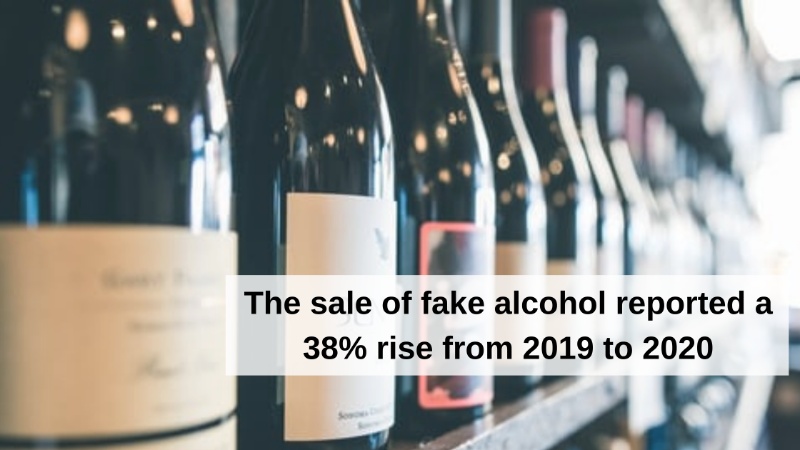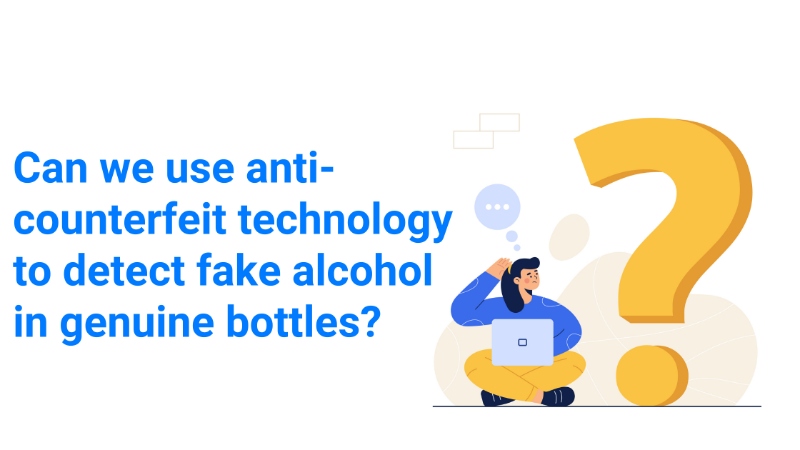
The pandemic of 2020 has brought in a new essential- alcohol and spirits. If people queued outside supermarkets for hours, there were similar queues outside wine shops. The desperation to purchase alcohol bottles, even illegally, was clearly visible in 2020. The sky-high demand is understandable. After all, people needed to calm their nerves amid an uncertain and deadly pandemic. What happens when it is easier and cheaper to fake it than make it? What ages better than fine wine? Apparently in the grey market, the wine bottles! The sale of fake alcohol in authentic bottles has been at an all-time high. Selling subpar and local alcohol in premium branded bottles is the most common way of counterfeiting in the liquor industry.
What is in your poison?
Ingenious methods of producing fake alcohol have become advanced. It is difficult for a regular consumer to understand the difference between fake and authentic alcohol. Did you know that even a sanitizer can be used to produce alcohol? Criminals take advantage of the desperation of the consumers without considering the health implications. Ethynyl is sold instead of methyl alcohol. Ethynyl is lethal but a common ingredient in fake alcohols. Selling fake alcohol gives criminals a huge profit margin. All they must do is steal spirits from petrol and diesel tanks and add color to them.
On one hand, making fake alcohol is easy. But the other major facilitating factor in liquor counterfeit is the genuine alcohol bottle. Authentic alcohol bottles can be purchased for cheap in stores selling scraps. All one has to do is refill these old bottles with fake alcohol.
Counterfeit in alcohol is more common than you might suspect!
What topped the list of most sold fake consumables in 2020? What product had a record rise in the sale of counterfeit during lockdowns? The sale of fake alcohol reported a 38% rise from 2019 to 2020. The liquor industry topped the sectors affected by counterfeit during the pandemic. If we look at absolute numbers, there were 138 racquets of counterfeit alcohol reported in 2020. 18556 bottles of alcohol were seized in the first two weeks of April in India. The number of cases of fake pharmaceuticals was reported to be 98, way below fake alcohol cases. This comes as a surprise because the pandemic and lockdowns created a scarcity of essential medicines.
If we look at the lockdown situations, then it is no wonder that COVID made the pastures greener for fake alcohol. The sudden disruption in the supply chain caused a huge imbalance in the demand and supply of liquor. Branded or not, people were desperate to buy any alcohol available in the market.

But beyond COVID, what makes the liquor industry an easy target for counterfeiting?
Desperate and unaware consumers, coupled with a high-profit margin trade make fake alcohol a thriving business.
- People are ready to pay a premium for international brands. When adulterated with cheaper local alcohol, the profit margin becomes irresistible to criminals.
- Many people are medically dependent on alcohol. Manufacturers of counterfeit alcohol exploit the dependency of poor consumers.
- Happy hours at the bar are great right? Hotels and clubs lure customers with free drinks during happy hours. But have you noticed that your drink doesn’t feel the same after a few rounds? Mixing local brands or water with high-end brands of alcohol is a cost-saving measure for many bars. It may be somewhat harmless to the consumers, but it can damage the reputation of the liquor brand.
- Do consumers care about the authenticity if it's cheap and in a branded bottle? Since a premium alcohol bottle is a status symbol, many unsuspecting customers would be happy to own the bottle irrespective of the content inside it. It is a matter of prestige but at what cost - Sometimes at cost of lives as we have seen on numerous occasions.
- Supply chain gaps: Illegal imports and custom evasions are common in the alcohol sector. More regulations have led to innovative ways to evade the authorities. So, an authentic bottle enters the country without any accountability and traceability. From then on, the supply chain becomes full of loopholes.
- Custom duties make alcohol expensive. Alcohol bottles are one of the few items that many law-abiding citizens are willing to smuggle on flights for friends and family. In a high-demand and controlled supply environment, where people are ready to buy off the hook, adulteration becomes easy.
Can we use anti-counterfeit technology to detect fake alcohol in genuine bottles?
The short answer is yes. The long answer is that we need a customized approach in the liquor sector. Recently, the Delhi Government was exploring 3D barcodes on liquor bottles. Primarily, these measures will reduce tax evasion. But track and trace technology enables increased visibility across the supply chain.
- Anti-counterfeit technology that uses AI and ML can help track sales records and grievances. So if your sales drop suddenly in a particular area or you are getting many complaints, your brand may be a victim of fakes.
- Low-cost authenticity verification technology encourages consumers to detect and report fakes with ease.
- Technology like blockchain, can help brands engage with multiple stakeholders even in low trust environments. Increasing stakeholder engagement is an important element of brand management for the sector.
- Filling scrapped old bottles with fake alcohol is the most common form of counterfeit. Tamper-proof and tamper-evident packages and seals make it difficult for people to reuse alcohol bottles.
Alcohol is heavily taxed in India. Also, branded liquor is expensive. When liquor brands look for anti-counterfeit measures, they need to take a holistic approach. On one hand, fake alcohol leads to a heavy loss of revenue in tax for the government. On the other end, fake alcohol can lead to permanent loss of health for the consumer. Along with strict regulations, anti-counterfeit technology can save brand reputation and lives. After all, should there be any effort left when it comes to saving innocent lives?



